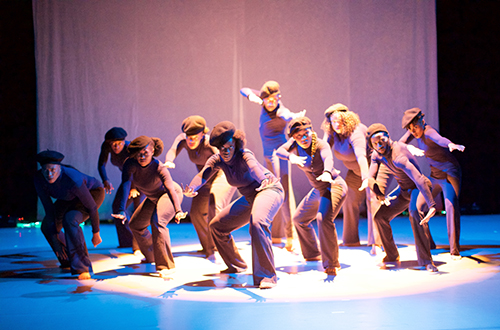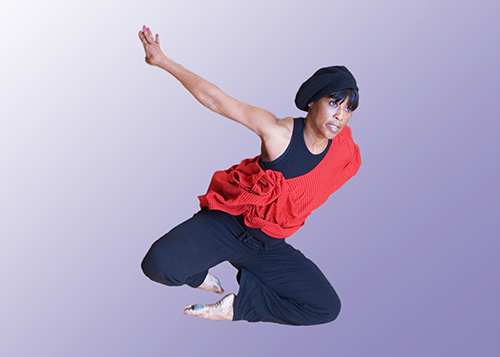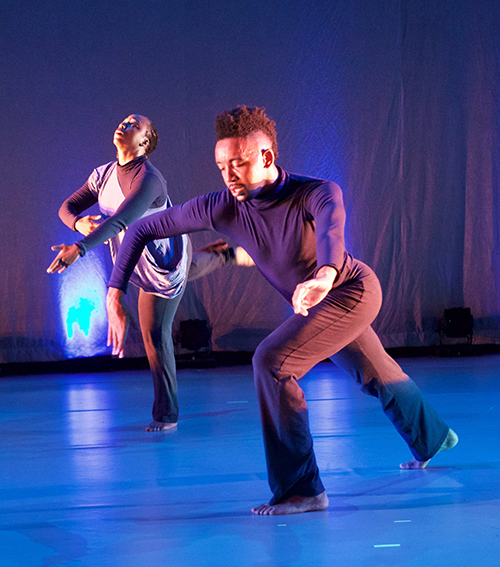Dancing the African Diaspora and Beyond
An Interview with Deborah Vaughan
BY EMMALY WIEDERHOLT; PHOTOS BY ED MILLER
Deborah Vaughan is the artistic director and co-founder of Dimensions Dance Theater, one of the oldest African American dance companies in the country (the company had its first season in 1973). Based out of Oakland, CA, Deborah continues to create her choreography and mentor younger artists. Here, she discusses her inspirations, frustrations and visions for the future.
~~
Where do you most commonly derive inspiration for your work? From personal, social or political matters (or a mix)?
I think it’s a mix. I often meditate for inspiration, and am also inspired by what is happening around me. It’s organic; it just happens. Oftentimes, it deals with what is happening in the world, and how what is happening in the world impacts me.
In the past year, Dimensions Dance Theater did a work called The Town, based on the gentrification going on in the Bay Area. More recently, we just finished Project Panther, which looked at the vulnerability of black communities and how what the Panthers did is very much connected and related to Black Lives Matter. We had done this piece before, but I felt it was important to revive it because of what’s happening in many communities now in terms of challenges with police. We had 10 to 15 Panthers in the audience, and they said they appreciated the approach to the work and that they had been represented well. My point, however, was more to have audiences look at past history and how that history is happening again now.
Looking at what’s happening now though, I’m just processing. I wonder if it’s even real.
Is it important to you to be identified as an African American choreographer, or as a female choreographer, or do you see the modifier as a form of tokenism?
Of course I’m black and female, and I would never deny that, but what I have had to deny throughout my career is being pigeonholed. People say: “Oh you’re black, you should do African dance.” And if I don’t do African dance, then I’m accused of not speaking to black people. What also has pissed me off is the idea of being an entertainer. While I hope audiences are engaged and, through being engaged, are entertained, I don’t necessarily see myself as an entertainer. Oftentimes, when people look at African dance, they are looking for sensationalism, but the dance form is not often respected in terms of tradition.
I don’t like to see black choreographers or dancers pigeonholed. No matter where in the world someone is from, each person has their own experiences. Who is to define what those experiences should or should not be?
What changes do you perceive are necessary in the dance world in order to achieve a more universal and diverse representation of voices?
If you persist and keep doing your work, people will hear your voice. Artists don’t need to listen to what critics say. Artists need to say what they want to say. How they bring that voice to the stage is what’s important, but that voice often doesn’t get the same opportunity as large mainstream organizations, like in ballet or opera. However, the only way for your voice to be heard is for you to keep doing your work. That’s the most important thing. As an artist, you have to define what’s important to you.
Because our communities and neighborhoods are getting more diverse, people have to listen to each other more. Artists can be the bridge and gateway in that regard, to share history, feelings and current events. Communication is more powerful when it happens through art. The time for art and communication is now, more so than ever.
Going back to what I said earlier, I don’t think the artists of today should be pigeonholed, and I think every dance artist should have the opportunity to bring what they want to express to the stage.
What do you hope is your contribution to the dance world?
I hope what I have brought and continue to bring are the experiences and expressions of what has happened throughout the African diaspora. The African diaspora is quite large, and includes Africa, the Caribbean, the United States, and everywhere else we’ve been in the world.
One other thing I’m hoping is to bring young choreographers’ work to the stage. I think we need to keep encouraging and helping younger artists who are discovering their voices and honing their work. But that work isn’t up for me or anyone else to define. I encourage work of all types. I want to see us depart from categorization. I hope choreography in the future will be broad, eclectic and indescribable, according to each artist’s voice and what they want to bring to the stage.
~~
Under the artistic leadership of co-founder Deborah Vaughan, Dimensions Dance Theater (DDT) has become widely recognized for its presentation of both traditional dances and contemporary choreography drawn from African, jazz and modern dance idioms. The diversity and inclusiveness of DDT’s repertoire has garnered the company national and international acclaim. DDT has traveled to Nigeria, Jordan, Germany, Zimbabwe, Cuba and throughout the United States, and has advanced African American dance as an art form through a series of interdisciplinary collaborations with composers, musicians and singers working in a wide variety of African and African American traditions.



